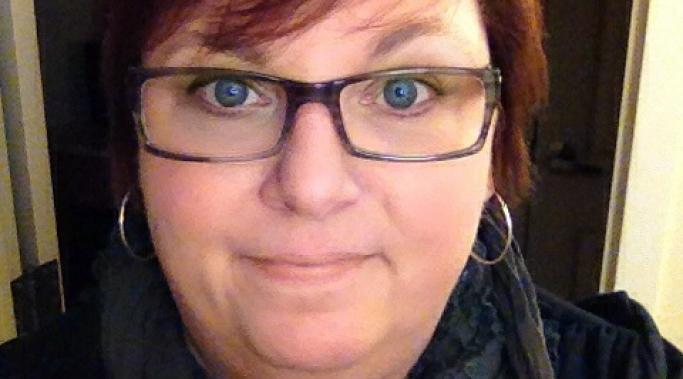I’m Chrisa Hickey, mom, wife, writer, and accidental children’s mental health advocate. I say “accidental” because I never intended my writing to be about childhood mental illness. But in 2009, after spending several months in therapy myself, trying to process raising a child with schizoaffective disorder, my doctor suggested I journal as a way to process the severe ups and downs our family was living through. Since I spend 40+ hours a week on the Internet as a full-time eCommerce professional, I started my journal as a blog.
Family Experience with Mental Illness
Sometimes, the only way I get a sense of what my son, Ben, goes through as he hears voices and tries to process them is through his poetry and prose:
I feel like everybody is piecing together this huge puzzle and I was born with it already solved. I guess that’s a post-life thing. But with me it’s always been about diving deeper. Delving and diving in gray water depths instead of trying to pull that water up to your level where its shade is altered. Its as a different sun shine in your in your world a mirror of a sort that you struggle to see for in refusing to see yourself in disacceptance you are condemned to see it everywhere you go on everyone else’s face….wow I am really showing myself now the strange level these “normal” people live on….hard it be to shatter these dreams of them so solidified by causality taken as righteousness. And the illusion of consciousness. - Ben, 2002
But today I got a different perspective, thanks to my guest blogger, Katherine Walters, who, like Ben, has schizophrenia - but with more insight into it.
Recently, Virginia State Senator Creigh Deeds spoke to Anderson Cooper at CNN and to 60 minutes about a family tragedy that, sadly, could have been avoided. In Deeds' words "the system failed my son."
I know how he feels - except that, luckily, my son is still alive. So far.
The truth is that, despite the fact that Ben has "case management" from the state, they have to do very little to help Ben, or us. They are overworked, underfunded, and all too glad to have us take the "burden" from their shoulders. But - what would happen to Ben if anything were to happen to us?
How Does the Mental Health System Fail?
Those with mental illness, and their families, need more support. Much more.
Let's go back to Senator Deeds. According to CNN,
Let me be clear, I love my son Ben with all my heart. That will never change. If you've followed this blog or read my book, you already know that about me. If you, too, love someone who has a mental illness, you share that feeling or you wouldn't be here on this site looking for support.
But, let's admit it. These illnesses suck.
Love my son, hate his schizophrenia.
In the book Silver Linings Playbook (just finished listening to the audiobook version, highly recommended), Pat Peebles believes in silver linings as he watches the "movie of his life." Despite four years in "the bad place"(i.e. mental health facility) for reasons he cannot recall, despite a reluctance to take the meds that are helping to stabilize him, and despite the lessons that reveal to him that happy endings are not always guaranteed, he persists in optimism (“If clouds are blocking the sun, there will always be a silver lining that reminds me to keep on trying”) through a great deal of emotional pain as life continues to throw lessons of reality in his path.
In our neighboring Newtown, Connecticut, too many families are steeling themselves for the anniversary of an unspeakable tragedy: the shooting at Sandy Hook Elementary School on December 14, 2012.
I've recently been interviewed for an article (coming out soon) about whether I think the Mental Health system in Connecticut has changed in the year since the incident. My answer? Not yet, not that I can see. If anything, we're in danger of sweeping the issues under the rug once again.
But the questions remain: Could it have been prevented? Should someone have seen the "signs"? And - more usefully, perhaps - what can be done to help stop future tragedy?
Knowing how to help a family member with mental illness requires knowledge about the mental illness, the mental health system, and insight into your family member's personal situation.
Last night, I received another e-mail cry for help from a reader.
"I began reading "Ben Behind his Voices" last night and have barely put it down. Our son seems to be following Ben's track. We don't know what to do. Any suggestions?"
I wish I had all the answers.
Apologies to my readers, new and old, for not having blogged for a few weeks. I was in London last month participating in an international conference on schizophrenia recovery, and lots of energy went into that experience.
The conference organizers had read Ben Behind His Voices, and so I was asked to share my experience as family caregiver (or, in UK_speak, "carer").
As you might imagine, I learned a lot more than I shared. The main lesson, reinforced:
When a loved one develops schizophrenia, feelings have no country borders. We do not stop loving when mental illness moves in. We do share feelings of grief, anger, confusion, determination, resentment, loss, helplessness, and more.
I connected first with Georgina Wakefield, my UK counterpart in many ways.
Today, nearly two months since my last post about Amanda Bynes, she has finally been admitted for psychiatric evaluation. What took so long?
This much I have personally experienced: until someone you love is of “harm to self or others”, it’s next to impossible to get him or her placed for evaluation. Unfortunately, sometimes by then it is too late.
Yesterday, Amanda’s parents were finally able to apply for conservatorship – a decision that was delayed, as it looks like Amanda will stay under psychiatric care for at least two weeks. For this time, as I know all to well, her family will have a time to regroup a bit, breathe a sigh of relief that Amanda is safe for the moment, and gather strength for the fight that lies ahead.
Like a film of cloudiness that filters the sunlight on a hazy day, my son Ben’s schizophrenia obscures some of the qualities that make him so dear. Without schizophrenia treatment, his abilities to connect, care, feel joy and share love seem almost impossible to see. With treatment, they are closer to the surface – but the 25% of him that is still obscured is sometimes heartbreaking, no matter how grateful we are that he is functional and mostly present. The presence of these clouds is lighter then, more like a haze than the thick formations when he is fully symptomatic. Still, Ben’s best qualities often seem dulled by that haze -and I miss the open, joyful child I used to know.
But sometimes, even the haze breaks – for an amazing moment – and I get a visit from Ben’s best self. Yesterday, I got a glimpse of his empathy, one of the qualities that get obscured as a negative symptom of schizophrenia.
It happened because of a tin of lip balm and it gave me a moment of joy and hope.
Why We Must Keep Developing New Schizophrenia Treatments









